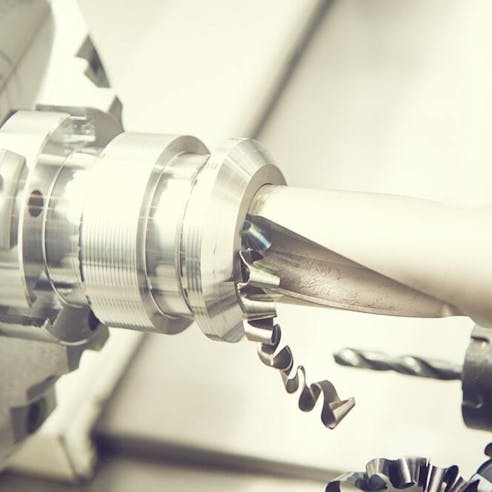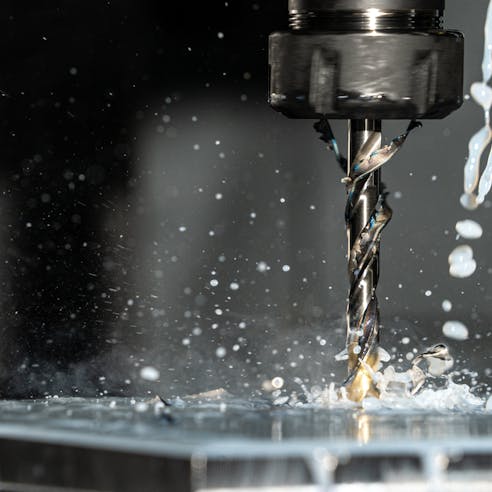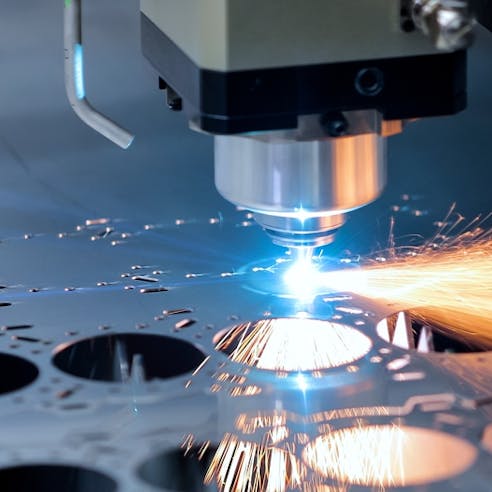CNC Drilling Services by Xometry
Xometry offers the highest quality CNC drilling services and can assist in the production of parts with intricate and complex geometries and excellent surface finishes.
CNC (Computer Numerical Control) drilling services are at the forefront of precision engineering. The process offers tailored solutions to meet the demanding needs of diverse industries. CNC drilling is characterized by precision and customization. It ensures that every hole drilled adheres to the tightest tolerances and specifications. Whether the task is a single prototype or a large-scale production run, CNC drilling processes guarantee accuracy at every step.
At Xometry, we leverage cutting-edge drilling technology to stay ahead of the curve. Our state-of-the-art CNC drilling equipment and techniques enable us to tackle even the most intricate and demanding projects. Whether those involve multi-axis drilling or advanced tooling, we have the technology to deliver outstanding results efficiently and consistently.
CNC Drilling Process
The CNC drilling process is a highly automated and computer-controlled method of hole drilling. It involves several precise steps to ensure accuracy and efficiency in the drilling operation.
Firstly, the process begins with the design of the part and the creation of a CNC program. Engineers or machinists use computer-aided design (CAD) software to develop a detailed blueprint of the part, specifying the location, size, and depth of the holes to be drilled. Once the design is complete, the appropriate drilling tools, such as drill bits or end mills, are selected and mounted on the CNC machine's tool holder. The workpiece, which can be made of various materials like metal, plastic, or wood, is securely clamped onto the CNC machine's worktable.
Next, the CNC machine is initialized, and the CNC program is loaded into the control unit. The CNC machine then automatically positions the tool at the designated starting point and begins the drilling operation according to the programmed parameters. This automated aspect of CNC drilling ensures consistency and repeatability in hole placement and dimensions.
Once all the holes are drilled according to the program, the CNC machine completes the process. Upon the completion of the drilling operation, the operator assesses the component for any potential errors or imperfections.
Materials Suitable for CNC Drilling
CNC drilling is compatible with a wide range of materials as listed and discussed below:
- Metals
- Plastics
- Composites
- Wood
- Ceramics

Metals
CNC drilling is widely used for various metalworking applications. Metal CNC drilling is compatible with a wide range of metals, including: steel, carbon steel, alloy steel, stainless steel, aluminum, titanium, brass, copper, and magnesium.
Plastics
Plastic CNC drilling can be used to drill various plastics. These include: acrylic (PMMA), polypropylene (PP), Acrylonitrile Butadiene Styrene (ABS), Polyvinyl Chloride (PVC), High-Density Polyethylene (HDPE), Polycarbonate (PC), and Polytetrafluoroethylene (PTFE)
Composites
CNC drilling can be used to drill holes in a wide range of composite materials, especially for aerospace applications. These include: carbon fiber, fiberglass, and plywood.
Wood
Wood CNC drilling is a CNC process that is very useful for creating hole patterns for woodworking applications and furniture manufacturing.
Ceramics
Ceramic CNC drilling is essential for achieving precision when drilling holes in ceramics, especially advanced and technical ceramics, ensuring the utmost accuracy in the process.
Advantages of CNC Drilling
CNC drilling offers several key benefits, including:
- Precision
- Efficient
- Repeatability
- Complex Hole Geometries

Precision
CNC precision drilling ensures tight tolerances, exceptional accuracy, and the ability to perform micro-drilling tasks with unmatched precision.
Efficient
CNC drilling streamlines operations by reducing setup time and enabling high-speed drilling processes, significantly enhancing efficiency.
Repeatability
With CNC drilling, achieving repeatable hole patterns is effortless, making it ideal for batch production and consistently delivering the desired results.
Complex Hole Geometries
CNC drilling excels in handling intricate hole shapes, custom configurations, and multi-axis drilling requirements. This makes it versatile for projects with complex hole geometries.
In need of CNC drilling services?
Disadvantages of CNC Drilling
While CNC drilling offers various advantages, it comes with some notable limitations and disadvantages such as.
High Equipment Cost
Investing in CNC drilling equipment can be expensive. This may pose challenges for businesses with budget constraints or tight investment considerations.
Skilled Labor
Operating CNC drilling machines requires skilled CNC operators with programming expertise. Ensuring that operators receive proper training is essential but can be a demanding task.
Tool Wear
CNC drilling is susceptible to tool wear, impacting tool longevity and incurring maintenance costs that need to be factored into the overall operation.
Noise Levels
CNC drilling operations can generate significant noise levels, necessitating measures to address workplace noise and ensure that operators use appropriate hearing protection.
Applications of CNC Drilling
CNC drilling's versatile precision finds uses in various industries. Listed below are the diverse applications of CNC drilling:
- Aerospace Components
- Automotive Parts
- Electronics Manufacturing
- Medical Devices
- Precision Holes
- Prototype Development

Aerospace Components
CNC drilling technology is used to create precision holes in aircraft structures, including: wings and fuselages, as well as engine components like turbine blades and jet engine casings. It excels in working with advanced composite materials and lightweight alloys that are essential for enhancing fuel efficiency and reducing overall aircraft weight. CNC drilling ensures that aerospace components meet stringent quality standards, making it indispensable in this sector.
Automotive Parts
CNC drilling is widely used in the automotive industry for manufacturing critical components such as: engine blocks, transmission parts, and brake systems. CNC drilling technology is utilized to ensure the precise alignment of holes in engine components, guaranteeing optimal functionality and reliability in automobiles.
Electronics Manufacturing
In the electronics manufacturing sector, CNC drilling is used to create precise holes in printed circuit boards (PCBs). These holes are crucial for component assembly, allowing for the precise placement of electronic elements. As the demand for miniaturization in electronic devices continues to grow, CNC drilling technology enables the creation of intricate and fine holes with exceptional accuracy. This precision is crucial for achieving the desired electrical connections and performance in modern electronic devices.
Medical Devices
CNC drilling is also used in the medical field, particularly in the manufacturing of surgical instruments and implants. It allows for the customization of holes in biocompatible materials to meet the specific requirements of medical devices. Whether it's creating precise holes for screws and pins in orthopedic implants or crafting intricate features in surgical instruments, CNC drilling ensures that medical components meet stringent quality and functionality standards.
Precision Holes
CNC drilling plays a crucial role in high-precision applications such as aerospace tolerances and optical component manufacturing, in which meticulous tolerance control is paramount. In the aerospace industry, CNC drilling ensures that critical aircraft components, including wings and engine parts, meet stringent tolerances. This guarantees structural integrity and safety. In optical component manufacturing, CNC drilling's precision also plays a key role. It enables the creation of flawlessly aligned and sized holes in components like lenses and prisms, ensuring optimal optical performance. CNC drilling's ability to consistently maintain tight tolerances distinguishes it as the technology of choice in industries in which precision is valued.
Prototype Development
CNC drilling can be used for rapid prototyping, during which proof-of-concept models can be created with custom hole configurations. This capability is invaluable in product design and development, allowing engineers and designers to efficiently test and refine their concepts. CNC-drilled prototypes facilitate the visualization and validation of ideas, accelerating the product development cycle and ultimately leading to innovative and well-engineered products.
Alternatives to CNC Drilling
When CNC drilling is not the most suitable option, several alternative machining methods can be considered for specific applications:
- Manual Drilling
- Milling
- Laser Drilling
- Waterjet Cutting

Manual Drilling
Manual drilling involves the use of hand-operated drills and is a simple alternative for simple hole-drilling tasks. It is often preferred for low-cost machining applications in which precision and high production rates are not critical. Manual drilling is commonly used in woodworking, hobbyist projects, and small-scale manufacturing scenarios. However, it lacks the precision, speed, and automation offered by CNC drilling machines.
Milling
Milling processes can serve as an alternative to CNC drilling when the goal is not just hole drilling but also the creation of complex shapes, pockets, and contours. CNC milling machines excel in precision hole creation, making them a preferred choice when tight tolerances are required. CNC milling offers versatility and can handle a wide range of materials, including: metals, plastics, and composites. It is especially valuable for industries that require intricate component designs, such as aerospace and automotive industries.
Laser Drilling
Laser drilling technology provides a non-contact machining alternative to traditional drilling methods. It is particularly suitable for applications that demand small-hole drilling with high precision. Laser drilling offers advantages such as: minimal material deformation, reduced tool wear, and the ability to create extremely fine holes. However, it's essential to consider the heat-affected zone (HAZ) when using laser drilling, as excessive heat can affect the material's properties. Laser drilling finds applications in aerospace, electronics, and medical device manufacturing.
Waterjet Cutting
Waterjet cutting is a versatile cutting alternative that utilizes a high-pressure stream of water or a combination of water and abrasive particles to cut through various materials. Abrasive waterjet cutting is ideal for materials that are challenging to machine with traditional tools, including heat-sensitive materials like plastics and composites. High-pressure waterjet cutting is used for applications that require precision and speed. Waterjet cutting has the ability to create intricate shapes, contours, and fine details without the need for tool changes. It's commonly used in industries such as: architectural design, automotive, and stone and tile cutting.
Why Choose Xometry for CNC Drilling Services?

Endless Options
Choose from millions of possible combinations of materials, finishes, tolerances, markings, and certifications for your order.

Easy to Use
Get started with our easy-to-use platform and let our experts take care of managing the project from locating the right manufacturing partner to delivery logistics.

Vetted Network
We are ISO 9001:2015, ISO 13485, and AS9100D certified. Only the top shops that apply to become Suppliers make it through our qualification process.